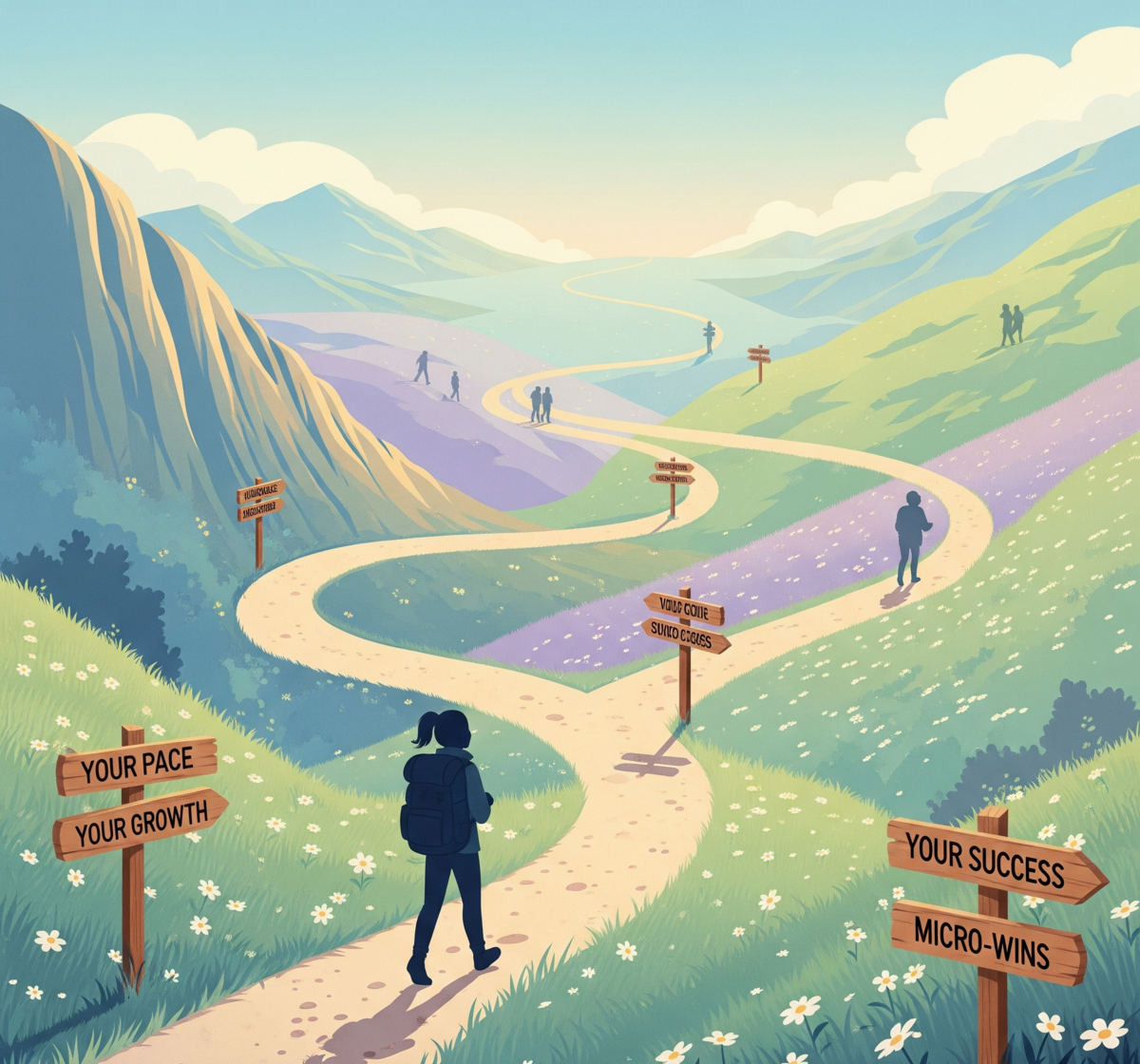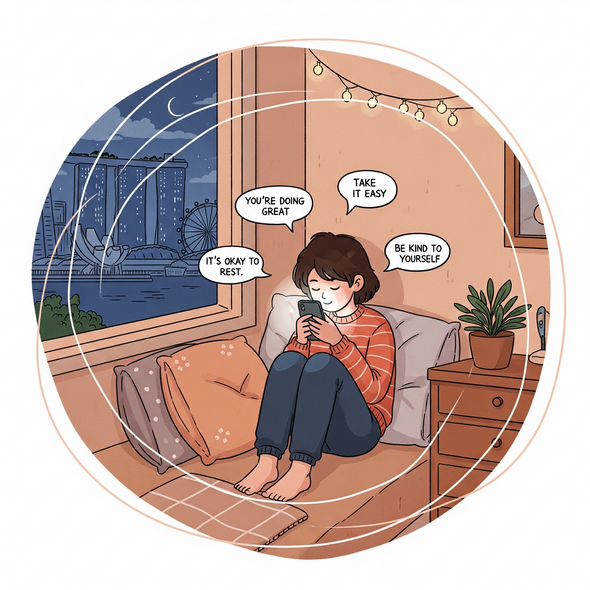Summary:
Many students experience anxiety from comparing themselves to peers on social media, where only successes are highlighted. This "highlight reel" effect can exacerbate feelings of inadequacy and stress, especially in competitive academic environments. It's important to recognize that everyone's path is unique, and success doesn't follow a single timeline. Emphasizing personal growth and redefining success can help alleviate the pressure of comparison.
The Highlight Reel Anxiety
You open Instagram or LinkedIn during a study break. Within seconds, you see a classmate announcing they landed a dream internship, another posting their acceptance letter to a prestigious university, and yet another proudly displaying perfect grades. You close the app and suddenly feel… behind.
It’s that sinking sensation: “I’m not doing enough. Everyone’s ahead of me.”
If this sounds familiar, you’re far from alone. Many high school and university students—especially in our hyper-connected world—struggle with school comparison stress. It’s that quiet, constant pressure to measure up to your peers academically, socially, and even professionally.
In Singapore, 1 in 3 young people report experiencing very poor mental health due to depression, anxiety, and stress, often linked to academic competition and social pressure.[1] Social comparison can magnify that stress, often leaving students feeling anxious, inadequate, or like they’re falling behind in life.
This article is here to tell you two things:
- Your feelings are valid—comparison is a deeply human instinct.
- There’s no single “correct” path to success, and yours is worth valuing just as much as anyone else’s.
The Psychology of the Comparison Trap
Social comparison theory, first proposed by psychologist Leon Festinger in 1954, suggests that we naturally evaluate ourselves in relation to others to understand where we stand.[2] It’s not inherently bad—comparing can motivate us to improve—but it becomes harmful when it leads to constant self-criticism and anxiety.
In the academic context, comparison is magnified by two forces:
-
Social Media Highlight Reels
Social media doesn’t show the full story. You’re seeing polished announcements, achievements, and celebrations—not the sleepless nights, failed exams, or self-doubt behind them. Social media can worsen mental health: exposure to highly idealized peer posts often triggers envy, eroding well-being over time.[3] Similarly, one study found that Facebook users who felt envious were more likely to develop depressive symptoms.[4] -
Ranking and Grading Systems
From class rankings to GPA, school systems often put us on a leaderboard—making comparison almost unavoidable. In competitive academic cultures like Singapore’s, this ranking can create an environment where students measure self-worth by grades alone. Over time, this can lead to burnout, anxiety, and even depression.
Why We Feel “Behind” in the First Place
Feeling behind isn’t just about seeing others succeed—it’s also about expectations. Many of these expectations are socially constructed.
- Cultural norms tell us we should hit milestones—graduate, get a job, marry—by a certain age.
- Peer norms make us think our pace should match that of our friends or classmates.
- Personal perfectionism pushes us to believe we’re never doing enough.
When you combine these with the constant updates of social media, it’s easy to feel like everyone else is running ahead on a race track while you’re still tying your shoes.
But life is not a single track. It’s a series of winding paths, each with its own terrain, obstacles, and views.
Deconstructing the “One-Size-Fits-All” Timeline
We often hear an invisible script about how life is “supposed” to go:
- Graduate by 22.
- Land your dream job by 25.
- Buy a house by 30.
But here’s the truth: there’s no universal timeline for success. Life is not a sprint on the same track—it’s more like a hike through different terrains. Some trails are steep and challenging early on. Others have flat stretches with long detours. Some give you breathtaking views later than others, but they’re no less worth taking.
Real-world examples prove this:
- J.K. Rowling published Harry Potter at age 32 after years of rejection.
- Steve Jobs dropped out of college, started Apple, was fired from his own company, and returned years later to launch the iPhone.
- Oprah Winfrey was fired from her first TV job before building her media empire.
- In Singapore, Chef Violet Oon only started her restaurant brand in her 60s, proving it’s never “too late.”
These stories highlight that success often looks different from the fast, linear progression we’re taught to expect.
The Mental Health Toll of Academic Competition
When we constantly compare ourselves, our brain can go into stress mode. The hormone cortisol rises, making it harder to focus, sleep, and stay motivated. Long-term, this can contribute to anxiety disorders and depressive symptoms.
Students under heavy academic pressure are also at greater risk for imposter syndrome—feeling like their achievements aren’t deserved. This creates a cycle: you succeed, but you still feel inadequate, so you push yourself harder, leading to burnout.
Practical Steps to Reclaim Your Path
If comparison is weighing you down, here are actionable strategies to protect your mental well-being and reduce academic anxiety:
1. Curate Your Feed
If certain accounts consistently trigger stress or feelings of inadequacy, mute or unfollow them. Fill your feed with content that inspires or educates rather than fuels anxiety. You’re not obligated to keep digital connections that harm your mental health. A study by found that reducing social media exposure to triggering content can significantly improve mood.
2. Celebrate Your Own “Micro-Wins”
Big milestones are great, but progress often happens in small, everyday victories. Finished an assignment early? Managed to rest well this week? Those count. Tracking these wins in a journal or app can help you see growth that comparison might otherwise hide.
3. Shift from Competition to Collaboration
Instead of seeing peers as rivals, look for ways to learn from them. Join study groups, share resources, or ask for advice. Collaboration builds community and often reduces the toxic edge of competition.
4. Define Your Own Success
Success might mean academic excellence for some, but for others, it’s work-life balance, personal growth, or creative fulfillment. Ask yourself: What does a fulfilling life look like for me, independent of external expectations?
5. Talk About It
You’re not alone in feeling this way. Confiding in a trusted friend, family member, or school counselor can help normalize your experience. In Singapore, organizations like Samaritans of Singapore (SOS) and Ommu provide confidential support for youth navigating stress and comparison.
Your Timeline is the Right Timeline
Here’s what it comes down to: Your worth is not defined by your pace relative to others. What matters most is whether you are learning, growing, and building a life that feels meaningful to you.
The next time you feel that “falling behind” anxiety creep in, remind yourself: life is not about keeping up—it’s about moving forward in a direction that matters to you.
Start Honoring Your Own Path Today
Honoring your own path starts with understanding your own feelings. If you're a youth in Singapore (aged 13–25) and need a private, non-judgmental space to sort through the pressure of school and comparison, you don’t have to do it alone.
Try chatting with Ommu, a mental wellness chatbot designed specifically for you. It’s a safe space to talk, available 24/7, right on your phone on WhatsApp.
Footnotes
Institute of Mental Health. (2022, October 18). 1 in 3 youth in Singapore have had very poor mental health: IMH survey. The Straits Times. Retrieved from https://www.straitstimes.com/singapore/health/depression-anxiety-stress-1-in-3-youth-in-s-pore-had-had-very-poor-mental-health-says-imh-survey
Festinger, L. (1954). A Theory of Social Comparison Processes. Human Relations, 7(2), 117–140. https://doi.org/10.1177/001872675400700202
Association between Social Media Use and Depression Among U.S. Young Adults. Exposure to idealized peer content on social media may elicit envy and diminish life satisfaction over time. https://pmc.ncbi.nlm.nih.gov/articles/PMC4853817/
University of Missouri (2015). Facebook users who feel envy have a higher risk of developing symptoms of depression. https://www.verywellmind.com/social-media-and-depression-5085354?utm_source=chatgpt.com




